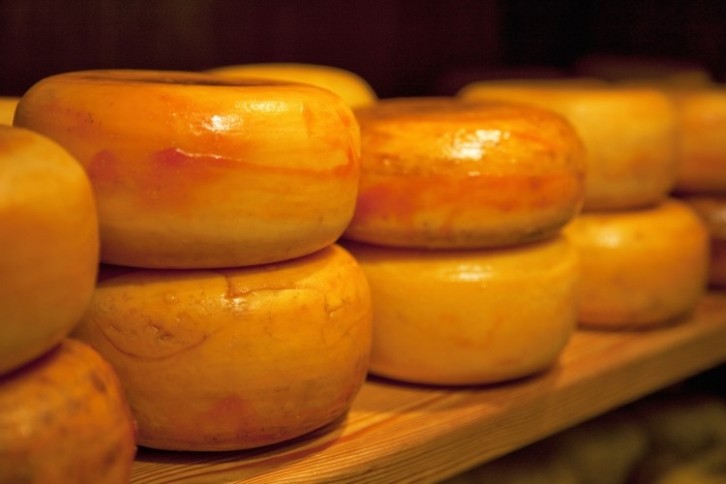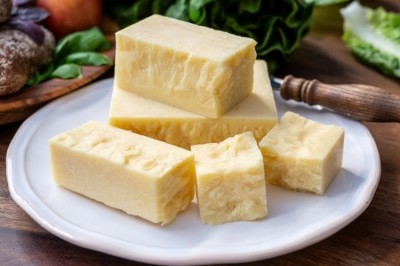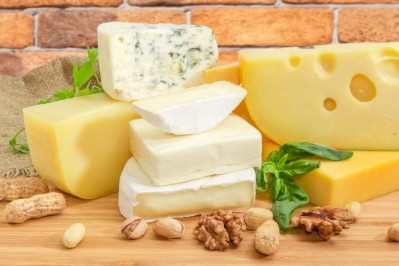'Quite controversial': Starter culture that speeds up cheese maturation 'performs better' than commercial alternatives

Cheesemaking is an expensive and lengthy undertaking, requiring anywhere from several weeks to more than a year to achieve the right flavor and texture properties. Hard cheeses require a longer storage time than soft varieties, meaning that space, temperature and humidity management come into play. For example, the cost of ripening cheddar was estimated to be around $640 to $1025 per tonne of cheese matured for nine months, according to a 2003 Upadhyay and McSweeney study.
Approaches to speeding up the maturation process vary, from raising the ripening temperature to using genetically-modified starter cultures or enzyme blends.
But researchers from the Technical University of Denmark (DTU) say they have grown from scratch a novel mesophilic bacteria strain that releases cheese-ripening enzymes quicker and doesn’t require adjunct cultures to be added to facilitate faster maturation, making for a more cost- and time-efficient process that's completely natural.
“There are solutions on the market for speeding up cheese ripening, but they all suffer from various drawbacks, e.g. high cost, generation of off-flavors, and they can be difficult to use,” explained Christian Solem, associate professor, Microbial Biotechnology & Biorefining at DTU’s National Food Institute. “Locking up large amounts of cheese in a ripening facility for months is associated with large inventory costs as well, similar to having money in the bank at a low or zero interest rate.”

DTU’s solution – a novel mesophilic starter culture - was tested on stored Danbo, a semi-soft cheese similar to Emmental; the starter slashed the cheese's maturation time from 25 to 13 weeks. Danbo is a surface-ripened cheese, meaning that microorganisms that grow on its surface secrete ripening enzymes that cause the cheese to mature; the more the microorganisms, the faster the ripening. During their experiment, the DTU researchers cultivated these microorganisms on whey in a fermentation tank, creating what Solem called ‘a shortcut for faster cheese ripening’.
Asked about the inner workings of mesophilic cultures - and why it typically takes so long for them to produce cheese-ripening enzymes - Solem explained: “Mesophilic cheese cultures are typically comprised of a mixture of the bacteria Lactococcus lactis and Lactococcus cremoris, where the latter usually releases maturation enzymes more efficiently,” said Solem. “Lactococcus lactis is more heat-tolerant and produces acid faster, but does not contribute much to taste, i.e. does not release so many ripening enzymes. Our culture is a Lactococcus lactis that is special since it releases ripening enzymes efficiently. It is also cheaper and easier to grow for a culture provider, making it more sustainable.”
"It is quite controversial that a simple culture designed from scratch performs so much better than commercially available cultures." - Christian Solem, associate professor, Microbial Biotechnology & Biorefining at DTU’s National Food Institute
Mesophilic cultures are typically used for ripening continental cheeses like gouda, cheddar and edam, we were told. Solem said that the academics hadn’t tested it yet, but their newly-developed culture should be ‘perfect’ for use in cheddar production, a cheese that requires milk to be gently heated before the culture is added. The starter does not require any special equipment than what dairies already use, he added.
“Another unique aspect of our culture is that it tolerates high temperatures far better than any mesophilic culture,” he added, “and since cheese firmness is controlled by the so-called cooking step, where the cheese curd is heated - up to 39C for cheeses prepared using mesophilic cultures and perhaps above 50C for cheeses prepared using thermophilic cultures - to expel the whey.”
Besides accelerating the rate at which traditional hard cheeses mature, the culture could enable the creation of extra-mature cheeses with an enhanced taste. “Our culture tolerates 45C and perhaps higher temperatures, which opens up possibilities for new harder cheese variants with the typical mesophilic taste,” confirmed Solem.
There’s scope to use this culture in the making of lower fat cheeses. When tested in mild gouda, the academics discovered that the culture single-handedly eliminated the bitterness typically associated with low-fat cheeses, which requires adjunct cultures to be added to improve taste. “Most young cheeses have a bitter flavour due to the proteolytic action of the rennet and the starter culture, which can disappear during ripening,” said Solem. “This bitterness can be eliminated more rapidly by adding adjunct cultures, e.g. Lactobacillus helveticus. When our culture was used, an adjunct culture was not needed, which also reduced costs. Thus, the culture may be used for low-fat cheeses as well.”
He added that for both cheese types, ‘flavor development was greatly accelerated’, much to the surprise of the dairy’s cheese experts that the academics had partnered with. “In the lab, we have measured the release of free amino acids, which is also related to maturation, and free amino acids build up more rapidly,” Solem said.
Asked if there are any downsides to using this culture – in terms of cost or healthy and safety requirements – the assistant professor added that the culture is cheaper and easier to grow and is a food-approved, natural solution, meaning that no regulatory or production hurdles existed to hinder its adoption more widely. “In my opinion, there are really not any downsides as I see it. In a world that is burning up because of global warming, more sustainable and resource-saving technologies for producing food are urgently needed, and this technology is an example of this,” he concluded.
Asked if there are existing solutions to rival this culture's properties, Solem said that as far as he was aware there was 'nothing similar out there' and called some of the studies' findings 'controversial'. "It is quite controversial that a simple culture designed from scratch performs so much better than commercially available cultures," he explained. "That a Lactococcus lactis culture performs better than a Lactococcus cremoris culture is also quite different from previous findings. Also, we find that autolysis - the breaking-open of the cells - is the limiting factor for ripening, where some researchers claim that other parameters are important."
The results of the study are currently being published in an article entitled Simple & Better – Accelerated cheese ripening using a mesophilic starter based on a single strain with superior autolytic properties which is yet to be released.
Sources:
Acceleration of cheese ripening
P.L.H. McSweeney, V.K. Upadhyay
Published July 2003
DOI: 10.1533/9781855737075.3.419









